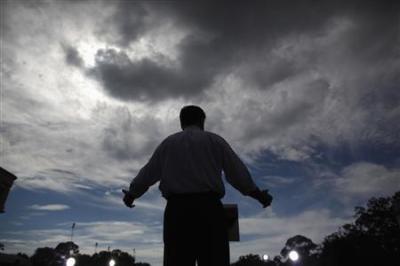After Hellish Week, Has Romney Already Lost?
Republican presidential candidate Mitt Romney had a difficult week in his quest for the White House. He received harsh criticism from liberals and conservatives alike after a hidden camera video showed him mischaracterizing about half of the country. This came after his opponent, President Barack Obama, climbed in the polls after his nominating convention and he made a gaffe in criticizing Obama's reaction to attacks on the U.S. embassy in Libya. Some believe Romney has no room to recover and has already lost the election, while others feel he still has a chance to win. Here is a roundup of some of those views.

Romney Has Already Lost
The hidden camera video "has killed Mitt Romney's campaign for president," Josh Barro wrote for Bloomberg the day that Mother Jones posted the recording. Barro believes the video is "utter disaster" for Romney because it reinforces the stereotype that he is a rich snob unable to relate to the average American.
"Romney already has trouble relating to the public and convincing people he cares about them. Now, he's been caught on video saying that nearly half the country consists of hopeless losers," he continued.
Washington Post columnist Ezra Klein is reluctant to say Romney has definitely lost, but believes that "we're quickly approaching a point where his comeback would be unprecedented in modern presidential history."
Klein's reasoning is based upon recent research by political scientists Robert Erikson and Christopher Wlezian. According to Klein, Erikson and Wlezian conclude, based upon polling collected from the last 15 presidential elections, that polls conducted after party conventions generally predict the outcome of the election because the debates rarely change the poll numbers. Since Obama emerged from the conventions with a lead, Klein reasons, Romney has little opportunity to recover.
Though he will not say it publicly, the Obama campaign's chief strategist, David Axelrod, also believes the race is already over, according to Major Garrett in National Journal. Candidates are defined in the mind of voters during the Summer, Axelrod believes. The campaign made a strategic decision to spend most of it money during the summer to define Romney as an out-of-touch plutocrat, because, Axelrod said, no presidential race has been "determined by paid media after Labor Day."
There are a few recent polls that also support the "Romney has lost" theory. A Pew Research poll, conducted Sept. 12-16, shows Romney losing by eight percentage points (51-43). Also, in two key swing states, Ohio and Florida, Fox News polls show Obama with a solid lead. The polls have Obama ahead by seven percentage points in Ohio (49-42) and five percentage points in Florida (49-44).
Romney Can Win
"Don't be fooled. Romney has a fighting chance," Paul Goldman and Mark Rozell argue for Politico. Goldman is the former chairman of the Virginia Democratic Party and Rozell is professor of public policy at George Mason University.
Contrary to conventional wisdom, Goldman and Rozell say, Romney does not have to win Ohio's 18 electoral college votes to win the election. If Romney were to win Colorado, Florida, Indiana, Iowa, North Carolina and Wisconsin, he would only have to carry Ohio or Virginia, but would not have to win both, to win the election. Another long shot would be to lose both those states but win Nevada and New Hampshire, which would result in a tie.
"It is a long shot indeed, but don't blame Team Romney for being incompetent. ... The fact is at the presidential level, we're in a Democratic era. Yet against the odds, Romney remains in the game," Goldman and Rozell conclude.
Some Romney supporters have also been arguing recently that many of the polls are wrong because they oversample Democrats. The recent Pew Research Poll showing Obama with an eight percentage point lead, for instance, had a sample that was 38 percent Democrats, 31 percent Republicans and 31 percent independents. A recent Ipsos/Reuters poll showing Obama with a five percentage point advantage is even more skewed toward Democrats. Forty-seven percent of the sample is comprised of Democrats and 37 percent are Republicans, with 12 percent calling themselves independents.
The partisan makeup of the Pew poll is about what it looked like in 2008, based upon exit polls. But the electorate was more Democratic than usual in 2008. Whereas Democrats had an enthusiasm advantage in 2008, now Republicans are more enthusiastic about voting than Democrats.
Also in Romney's favor, a Sept. 20-22 Rasmussen poll shows the race to be a tie (46-46), and a recent Gallup tracking poll shows Obama with only a two percentage point advantage (48-46).






















